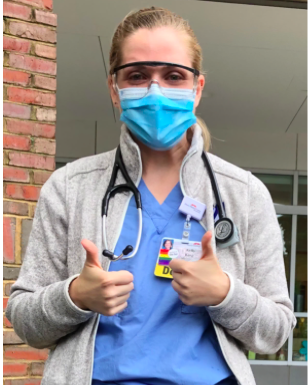Dr. Kelly Kathryn King of UMass Medical School works at Portland Maine Medical in the family medicine department. Dr. King was born in 1992 in Somerville, and she graduated Wellesley High School in 2010.
Though on a more personal level, my sister, Kelly, was born in Somerville and went to their public schools until the fourth grade. Then, she went to Natick Middle School until the sixth grade. Finally she ended up at Wellesley High and went on to graduate from both college and medical school. Kelly is actually only my half sister, because we have different fathers, but she was far from half of a sister to me and my brother. That’s why I will not be referring to her as my “half sister”, because she’s not to me. She’s always been a caring person who has the most compassion I’ve ever seen. That’s the driving factor that led me to this interview, because I believe her opinion matters.
I asked my sister a series of questions relating to her experiences in the medical field as a young woman, but her answers changed my topic. Truly, my sister had little concrete encounters of sexism, rather she has seen far more experiences of racism and homophobia towards her colleagues and friends. This is what she is most concerned about. So, that’s what I will be sharing with you all.
Q: When did you decide that you wanted to be a doctor?
A: “I loved biology class my junior year of high school. Before that class, I had never really enjoyed school, so it was really eye opening to me that I found a class I finally enjoyed. After experiencing that class, I decided that I wanted to go into the medical field.”
Q: What are some challenges you’ve faced being a woman throughout your career so far?
A: “Thankfully, there are lots of changes. About 50% of current medical school students are now female. But I will say, there are still times when, particularly older male physicians don’t seem to respect the opinions of younger female physicians as much as they might respect younger male physicians.”
To understand this better, I continued with asking;
Q: Can you think of any times that you were doubted because you’re a woman in the medical field?
A: “I think it’s hard to tell. Most people that have sexist perceptions towards female physicians wont come right out and say them. It’s usually more a feeling or inkling that I get from both other providers and also patients, and then I’m the one making an assumption that it’s my gender which is making them treat me differently. And I think that’s why it’s so hard to talk about gender roles in medicine and how they impact our care of patients, because you sort of feel it, but there’s no way to really pin it down or have that concrete proof of sexism. Being a cis, white female, the biggest glaring difference i can see between myself and some other patients or co-workers, is my gender. But no one has ever directly said they don’t want my care because of my gender. Because I have colleagues who are not cis, or white, and run into certainly more preducjuices in this feild than I do, that they have a lot more examples of being doubted. I can imagine that it would be hard not knowing why patients don’t respect them. And i can also imagine that being really tiring especially when you’ve worked so hard to be where you are.”
So, to sum up some of what my sister told me in our interview, there’s always things to improve upon in the medical field. Before, a major change that needed to happen was the improvement in treatment of female doctors and nurses. Now however, there needs to be more change in the treatment of a different group of people, members of the LGBTQ+ community and those of color. So, for me, a takeaway from this interview with a young female doctor is that medicine isn’t the only thing constantly changing, but the social constructs and behaviors are rapidly shifting as well.

